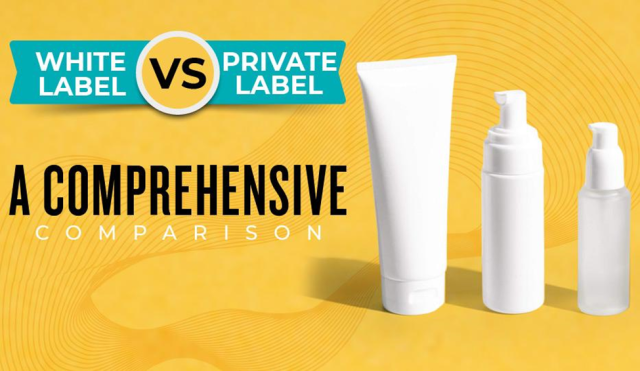One of the most popular subjects of conversation is private labelling. But, we must first grasp private labelling before moving on to further specifics. Choose a private label or white label manufacturer who can help you through the process and produce these products if you want to develop your line of pet or personal care goods. Yet, because the two terms are frequently used synonymously, it can be challenging to determine your best choice.
The main distinctions between white and private labels will be covered in this article, along with which model will work best for your business and how to use this knowledge to achieve tremendous success in your endeavours. First, let’s start with the white label vs private label concept before moving on to the history of these relationships and some common examples.
What is Private Labeling?
Private-label skincare allows you to promote a specific product instead of being constrained by what is on the label. Compared to white labelling, private-label skincare products offer far greater customization. Beauty firms who desire more control over the product recipe and branding might consider using these producers.
What is White Labeling?
When a third party is hired to produce one of their formulations under the client’s brand name, this is known as white labelling. In this case, a firm has control over the branding and packaging of the product but not the ingredients used to make the cosmetic product.
Differences and similarities between White-Label vs Private Label Cosmetics
Here are seven points highlighting the similarities and differences between white-label and private-label cosmetics:
Similarities:
- A third-party manufacturer manufactures both white-label and private label cosmetics.
- Both can be customized with branding and packaging to fit the brand owner’s needs.
- Both can offer cost-effective solutions for companies looking to develop their cosmetic line.
- Both offer a range of cosmetic products, including skincare, haircare, and makeup.
Differences:
- White-label cosmetics are pre-made formulations that can be sold under a brand’s name, while private label cosmetics are custom formulations explicitly made for a brand.
- White-label cosmetics can be sold to multiple brands, while private label cosmetics are exclusive to one brand.
- Private-label cosmetics typically have higher minimum order quantities and require longer lead times for development.
- Private label cosmetics offer more control over the formulation and packaging, while white-label cosmetics are more limited in customization options.
Overall, white-label and private label cosmetics offer a range of benefits for brand owners looking to develop their cosmetic line. Still, the level of customization and exclusivity will vary depending on the chosen option.
Factors to consider when choosing between private and white labelling
Several factors must be considered when choosing between private and white labelling. Here are some key points to keep in mind:
-
Brand identity:
Private labelling allows you to create a unique brand identity, while white labelling requires using a pre-existing brand.
-
Control over product development:
Private labelling gives you more control over product development, whereas white labelling products are typically already developed.
-
Cost:
White labelling can be more cost-effective than private labelling, as you don’t have to invest in product development and branding.
-
Quality control:
With private labelling, you have more control over quality control measures, while with white labelling, you rely on the quality of the pre-existing product.
-
Time to market:
White labelling can be a quicker route to market, as the product is already developed, while private labeling may take longer due to product development and branding.
-
Customer perception:
Private labeling can create a perception of exclusivity and quality, while white labeling may be perceived as generic or lower quality.
-
Distribution:
White labeling products may have more established distribution channels, but you’ll need to develop your distribution network with private labelling.
-
Long-term goals:
Consider your long-term goals for your brand when deciding between private labeling and white labeling. Which option aligns best with your overall business strategy and objectives?
Conclusion:
In conclusion, if you’re looking to start your brand or expand your product offerings, choosing between private labeling and white labeling can be difficult. However, with RevieraOverseas, you don’t have to choose one. Their flexible solutions allow you to customize your products while benefiting from their expertise and reliable sourcing.
Take your business immediately. With Reviera Overseas, you can rest assured that your products will be of the highest quality and meet your customers’ expectations. Visit our website today to learn more about our private and white-labelling services.
